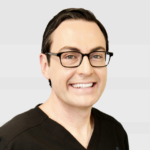Posted on April 11, 2023 in Rhinoplasty
Rhinoplasty is a cosmetic procedure to enhance the proportions of the nose for improved facial harmony. This procedure can alter the size, width, profile, and tip of the nose for a more symmetrical appearance. Read on if you are considering a rhinoplasty but would like to learn more about what to expect afterward.
Rhinoplasty Recovery Overview
Immediately following your rhinoplasty, you will likely experience some swelling, bruising, and soreness. This is to be expected and will last for several days. Some people may also experience numbness in the tip of their nose, upper lip, and gums. The feeling will return to these areas within a few weeks to months.
A drop pad will be placed under your nose to collect any fluid during recovery. Avoid blowing your nose for at least one week after surgery, and do not put anything into your nose. If you must sneeze, try to open your mouth and sneeze naturally.
Medication
Dr. Ransom will let you know when you can restart taking any medications that you may have stopped before surgery. Avoid taking anti-inflammatory medications such as Advil, Motrin, or Aleve for three weeks following your procedure, or until Dr. Ransom says it is okay.
You will also be given a saline nasal wash to keep your nasal passages open and clean. Follow the instructions given to you by Dr. Ransom regarding how often you should perform these nasal washes.
Reducing Swelling
To best reduce swelling and discomfort, cold packs can be placed on your nose for 10-20 minutes at a time. Be sure to place a cloth between the cold pack and your skin. Also, sleep with your head elevated with pillows to reduce swelling, or sleep in a reclining chair.
Activity
After your rhinoplasty, it is important to rest. Getting enough sleep will help you to recover. Try to get up and walk every day, increasing the amount you walk each day. Walking is good for boosting blood flow and helping to prevent constipation. Avoid bending over and lifting anything heavier than 10 pounds, which may include heavy grocery bags, backpacks, and children. Because of this, you may need to employ help from friends or family to help with childcare or housework for a while.
Diet
You can continue to eat a normal diet following rhinoplasty surgery. If your stomach becomes upset from pain medication, try sticking to plain foods such as rice, broiled chicken, yogurt, and toast. Your bowel movements may not be normal right after surgery, which is normal. Try to take fiber supplements daily if you are experiencing constipation.
Schedule a Consultation
If you are interested in learning more about cosmetic nasal surgery, schedule a consultation with Dr. Evan Ransom at Ransom/MD. Call our San Francisco office at (415) 877-6592 or contact us online to set up your first appointment.
Dr. Evan Ransom is an Ivy League-educated and Ivy League trained Facial Plastic and Reconstructive Surgeon. He is a Double Board Certified Head and Neck Surgeon and Facial Plastic and Reconstructive Surgery and fellowship-trained in facial plastic, reconstructive, and laser surgery. His practice is in the San Francisco Bay Area, serving patients from San Francisco, Oakland, Marin County, Palo Alto, Silicon Valley, Walnut Creek, the East Bay, and all over Northern California.
 (415) 550-1077
(415) 550-1077 San Francisco
San Francisco

